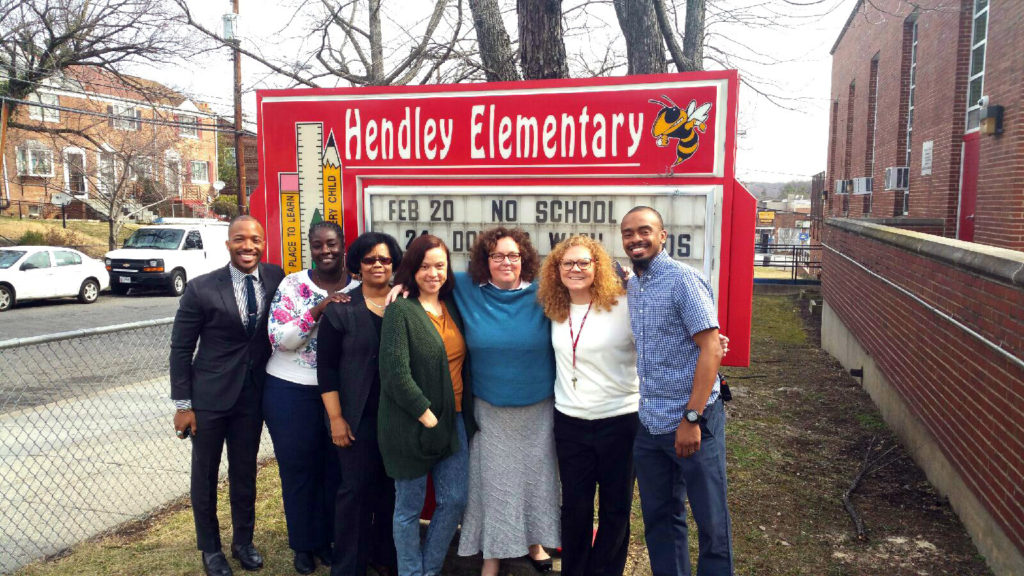February Person of the Month: Lori Craig

Members of the Hendley RTI team pictured left to right: Clarence E. Stansfield, Dean of Students; Rosemary Anderson, Social Work Consultant, Turnaround; Lori Craig, Social Worker and RTI Coordinator; Joan Myer, Reading Specialist; Francis Evangelista, Assistant Principal for Special Education; Patty Ansani, SW, RTI Attendance Coordinator and Christopher Cannaday, Dean of Students. Not pictured: Sundai Riggins, Principal; Rose Brown, Special Education Teacher; Anna Katt, Instructional Coach-Math and Eleanor Jennings, Instructional Coach-ELA.
Lori Craig is a social worker at Hendley Elementary School, a first-year Turnaround partner in Washington, D.C. Social Work Consultant Rosemary Anderson nominated Lori for her leadership in the development of Hendley’s Response to Intervention (RTI) team and unwavering belief in the partnership with Turnaround.
THE 180: What does a typical day look like for you?
LORI CRAIG: Day-to-day is providing counseling and behavior supports for kids, pushing into classrooms and doing observations, conferencing with parents and conducting home visits. Home visits could be related to attendance, behavior or academics, it just depends. So we do them pretty regularly. And there might also be some impromptu stuff like crisis intervention. I’m also the homeless liaison.
THE 180: The homeless liaison? What is that?
LORI CRAIG: Each school in the district has a homeless liaison contact person. Hendley’s population of homeless families probably teeters around 50 (10% of the school’s population) but it fluctuates.
[Families who are] identified as being homeless live in some type of temporary situation – whether it is in a shelter, a hotel or maybe they’re doubled up with family members. I work with these families to connect them to community agencies that can provide additional support in finding some form of permanent housing.
THE 180: How has the creation of a formal Response to Intervention (RTI) team helped you better meet the needs of students?
LORI CRAIG: We’ve designed our Kid Talk meetings to be grade-level sensitive. Early childhood (kindergarten through second grade) teachers meet in one group and third through fifth grade teachers meet in another group. Each group meets to identify student-based needs as it relates to attendance, behavior and academics. Then students with the highest needs are brought to the RTI meetings so we can develop a plan to better help the student. Making the Kid Talk meetings smaller has really helped – it allows more time and people don’t get lost in a larger group. You’re really able to pinpoint those kids [in need].
THE 180: Even though you lead the RTI team, I understand it’s really a team effort. Why do you think it’s so important to have all of these perspectives integrated into this team?
LORI CRAIG: There’s ten of us. We have two instructional coaches, a special education teacher, two deans, a reading resource teacher, our assistant principal, who’s also our special education coordinator, our principal, another social worker and myself. You cannot run an RTI team with just one or two people. It’s good to have a variety of people from various disciplines to offer their input and hear different perspectives. Everyone is very free in providing support, and does so from the angle of the area that they are actually focused on.
THE 180: What strategies and practices has Turnaround brought to the school that you really find to be helpful?
LORI CRAIG: I think Kid Talk has been instrumental with teachers, because it gives them an outlet to say, “hey, this child is having problems”. You’re meeting, you’re discussing individual kids and trying to figure out before you bring them to the table for RTI. The [professional development] trainings have gotten our teachers to take a different look in terms of what the outcomes and expectations should be for children.
THE 180: Have you seen a shift in the school with the partnership at all so far?
LORI CRAIG: I believe so. The Turnaround team really wants to see progress at our school. They see some of the difficulties and I think that’s important as well. So the struggle is there but it can be improved…they are in the trenches right there with us. And I think that’s important because sometimes people are in their ivory tower and they don’t see what’s happening on the ground.
THE 180: What do you think is the most important thing that students need to succeed?
LORI CRAIG: It has to be one thing?
Parental involvement. If you have parental involvement you’re going to get the academic support. If you have parental involvement, attendance will improve. If you have parental involvement, the behaviors can be changed. If there’s an issue with behavior then some strategies need to be supported in the home, not just at school.
THE 180: How do you solve for situations where the parent might not be very involved, or the parent might not be around?
LORI CRAIG: I do a home visit. When I see that parents are not responding to telephone calls or they are not coming to the school, I will meet them where they are. It makes a difference. And they respond, for the most part, on a very positive note when they see that you have come there. Even if it’s an unscheduled visit, you will get them to become a little bit more involved. You have to build trust and establish relationships. That’s part of being a social worker.
THE 180: How does the partnership translate to the student and the parent level? Do they see the partnership with Turnaround?
LORI CRAIG: Turnaround members know our parents, and the ones that they don’t know they’re going to get to know. They are very involved with the students and pretty much act as if they are part of the staff, which they are. There are greetings in the morning and they have intervened when needed. So I think in terms of parent-child relationship with Turnaround, it’s evident. People see them as part of the Hendley family.

Share This Story